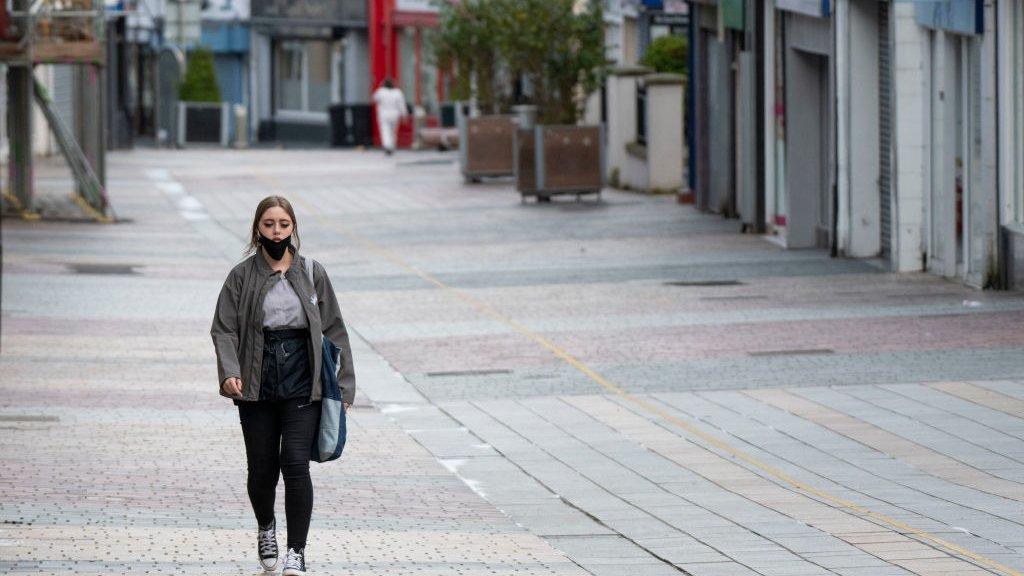Covid-19: Merthyr Tydfil's 'closeness and community' spreading virus
- Published
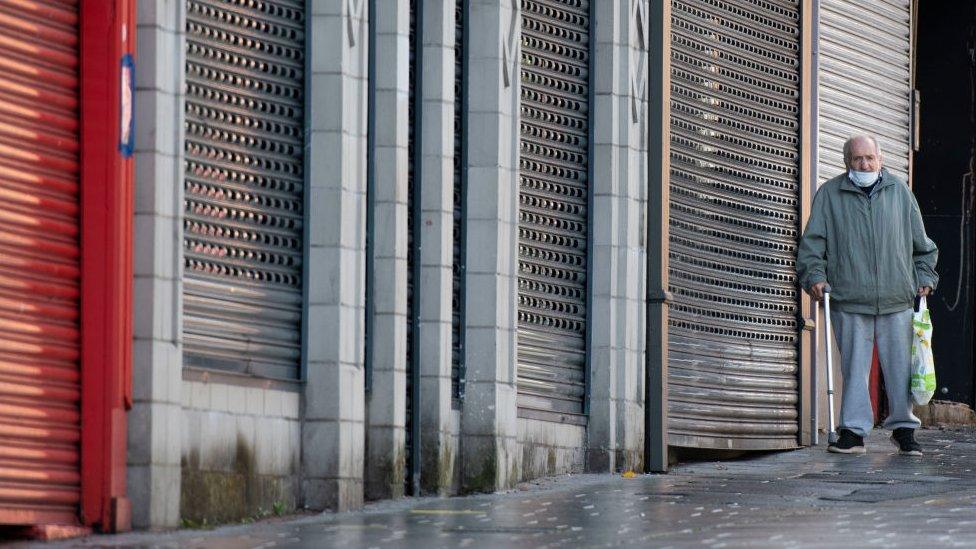
Merthyr Tydfil in lockdown: It has been among the worst-hit areas of the UK for case rates for several days
"The nature of the people in the valleys is to be close, we need to be close...you are trying to change a culture that has been in the DNA for centuries."
Merthyr Tydfil has one of the worst case rates for Covid-19 in the UK, and the highest rate of infections in the whole of Wales.
But with people in the county having been living under lockdown for almost six weeks, why is this Valley's county being hit so hard by the virus?
Front-line medical staff have spoken of families across the county being destroyed by the virus, homelessness is on the rise, and people are turning to foodbanks.
But while community spirit remains strong, with more people volunteering to help those isolating and vulnerable, and neighbours checking on each other, there are fears the friendliness of the valleys could be a major part of the problem.
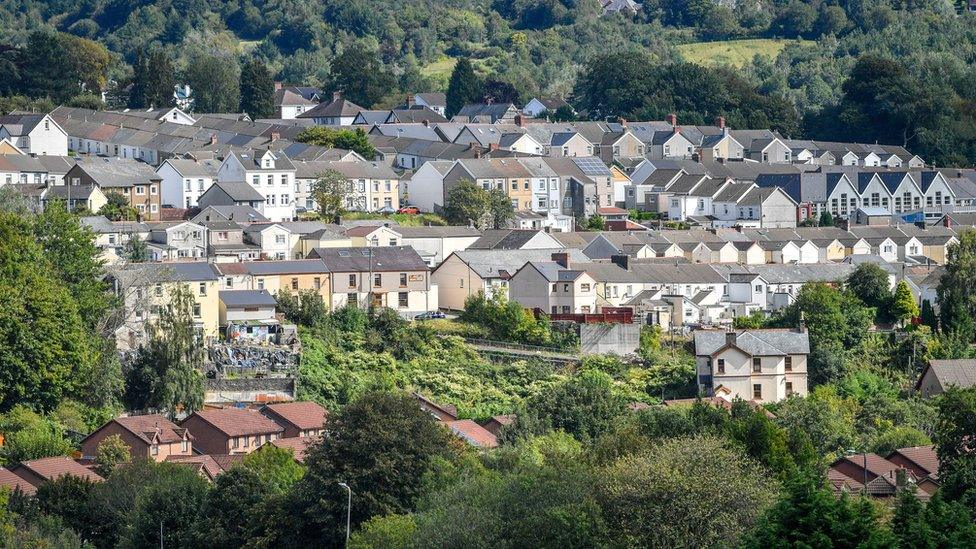
The tightly-packed terraced streets are being blamed for the rise in the virus, with people living on top of each other
Why the cases in Merthyr are so high is a complex picture.
Those in charge of the pandemic's response point to an array of issues, from outright rule breaking, to "lockdown fatigue", workplace transmissions, and people having no choice but to break the rules in order to earn a living, feed their families and survive.
But while much is being made of those having house parties and having bonfires, officials are keen to point out the reason why Merthyr is struggling is not about blame, but about people's sense of community.
"There is no more non-compliance in Merthyr than anywhere else in Wales, the majority of people are trying to be really responsible, they are doing what they can to protect each other," said Public Health Wales' Heather Lewis.
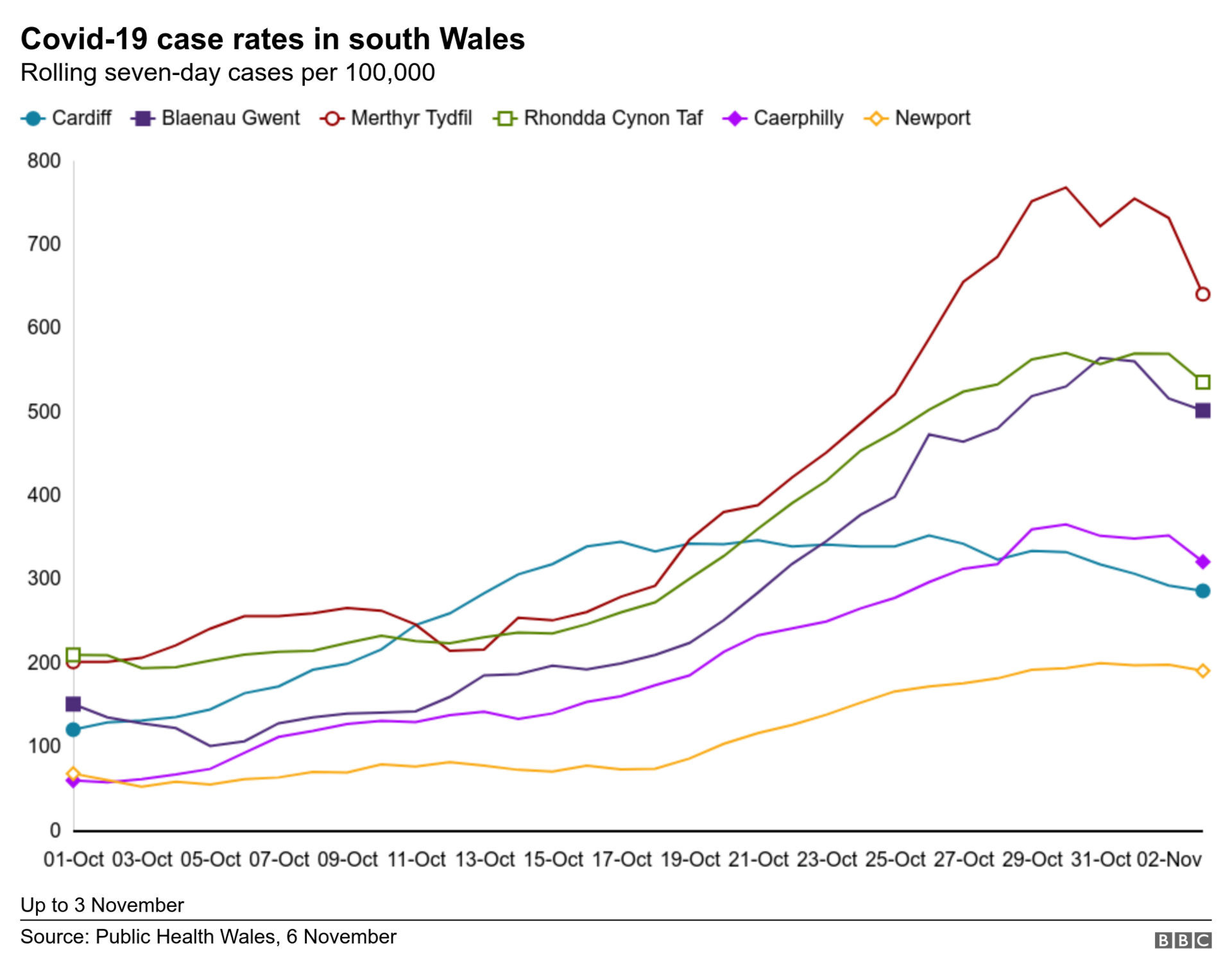
Before the Wales-wide "firebreak" lockdown began on 23 October, people living in the county had already been under local lockdown restrictions for a month.
While people have been banned from mixing with others outside their household outdoors, and are being told to only travel for essential reasons, cases continue to rise.
Mrs Lewis, consultant in health protection for Cwm Taf Morgannwg Health Board, said it was mostly due to people chatting indoors, which is why the message has been to stay at home and limit physical contact.
"You are more likely to get Covid from someone you know than a random person in a supermarket, people are fantastic with social distancing in work, but when they go to someone's house, they relax," she said.
Many on the ground say it is hard to stem the spread in estates, towns and villages across the valleys, as many live close to their extended families, and popping round to check on relatives, neighbours and friends is a way of life.
Dr Chris Williams said even sitting across a table from someone else could lead to transmission of the virus
Across Wales, areas classed as the some of the most deprived, with highest rates of unemployment and in-work poverty, appear to have been the hardest hit.
In Merthyr Tydfil, figures show that one of those worst affected areas in the county is the Gurnos, one of the most deprived places in Wales, where about 5,000 people live.
"You are all condensed into one community, there's one shop, and one place that everyone goes to, it's always going to be quite difficult in these communities," said Lee Davies, a councillor for the Gurnos.
"People are living on top of each other. They are really friendly, they talk to each other in the street, they're calling in each other's houses, to make sure they're OK."
He said he was on the estate last week to talk to someone who'd had issues with anti social behaviour and was invited in, but said he could not due to the rules.
"Two minutes later, she said 'I'm glad you didn't come in, I've got Covid'," he said.
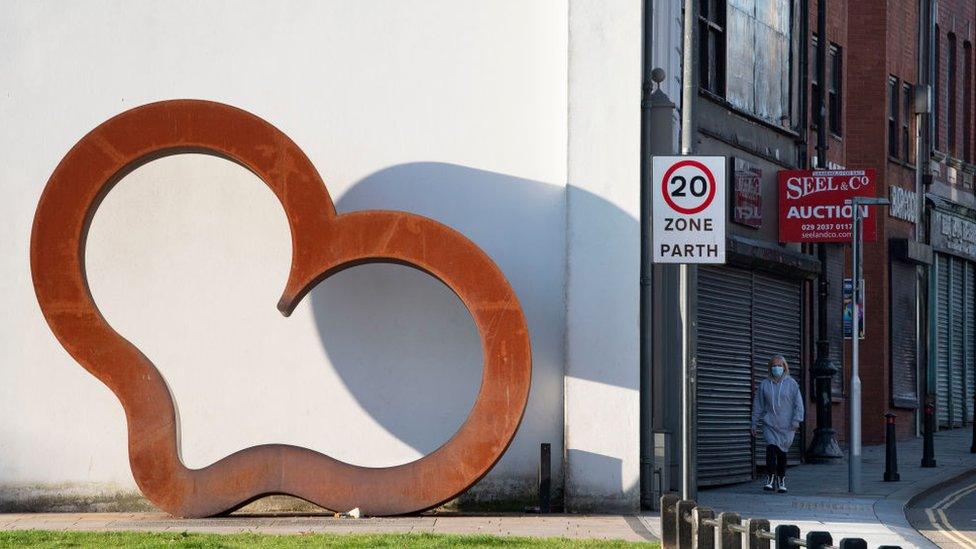
He said many people there were out of work or feared losing their jobs if they had to self-isolate.
It's a message repeated by many working in communities, where people in casual and zero-hour contract jobs face not being paid if they stay at home.
"I'm really concerned for people's mental health, people losing their jobs, not being able to afford their bills and food," said Mr Davies.
"There is support out there, the community support has been incredible, but people are proud, they don't want to ask for support, but it is hard. One family in Dowlais... all four of them have got it, and they're not getting paid because they are not working."
Mr Davies, also runs the Gurnos Men's Project, a group which aims to help build confidence and skills in the community in a bid to get them into work, and said, while they had met on Zoom, not being able to see each other in person was a problem.
"People are frustrated, people are struggling with their mental health, not seeing friends and family, some people are disregarding rules, there's lots of families that have lost work and they're struggling," he said.
'We're hemmed in by cases'
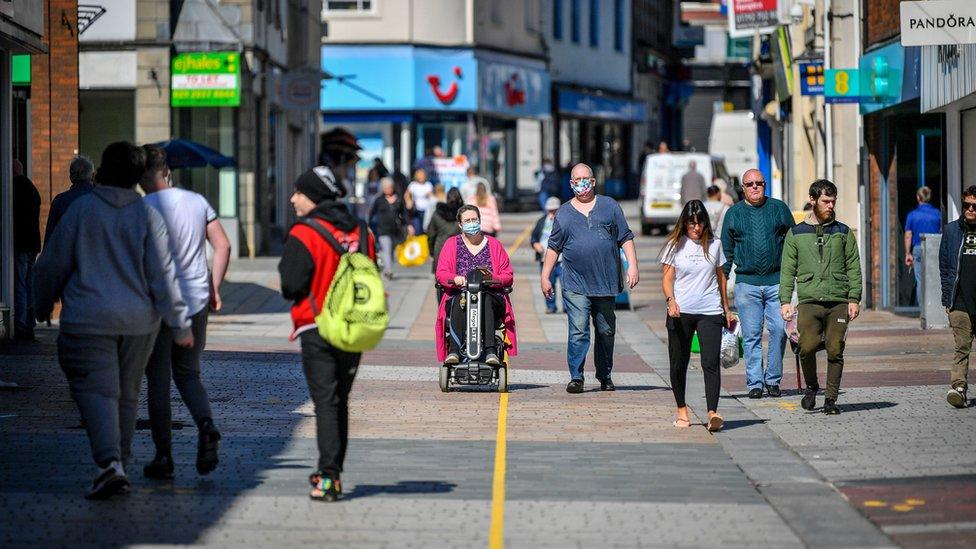
Shoppers got out and about before lockdown forced non-essential stores to close
On Wednesday, Merthyr Tydfil got the title no-one wants and became the place with the worst case rate in the UK, with 741 cases per 100,000 people.
While this has now fallen, with figures published on Friday showing a drop to 639.9, it remains the worst-hit area in Wales.
All three areas with the highest Covid-19 rates lie in the valleys, with Rhondda Cynon Taf and Blaenau Gwent also both having rates in excess of 500 per 100,000 of the population.
Heather Lewis said the issue in the valleys came down to the geography - such as the narrow terraced streets and tightly packed communities - and also the culture.
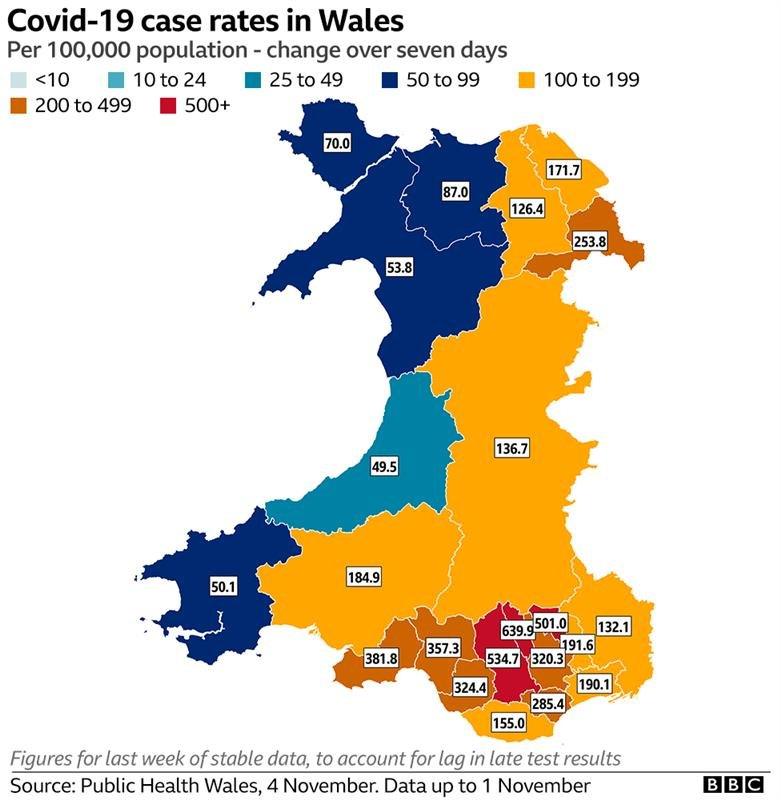
While clusters exist in workplaces, and cases in care homes are increasing, the majority of transmissions are happening in people's homes and social networks, with cases not confined to one area, but spread across communities.
"In places like Powys and rural areas, people often have to get in the car to see their friends and family, and that can make them stop and think, but in these communities people tend to live close to their extended families, and are just popping round next door," she said.
"It is such a community, there is such a sense of togetherness. It would be lovely in normal circumstances, but in covid it is a massive problem.
"People are used to being in these close-knit communities, popping round to their mum's, having a cup of tea, we are asking people to change behaviour which has built up over decades, which is difficult."
'People have had enough'
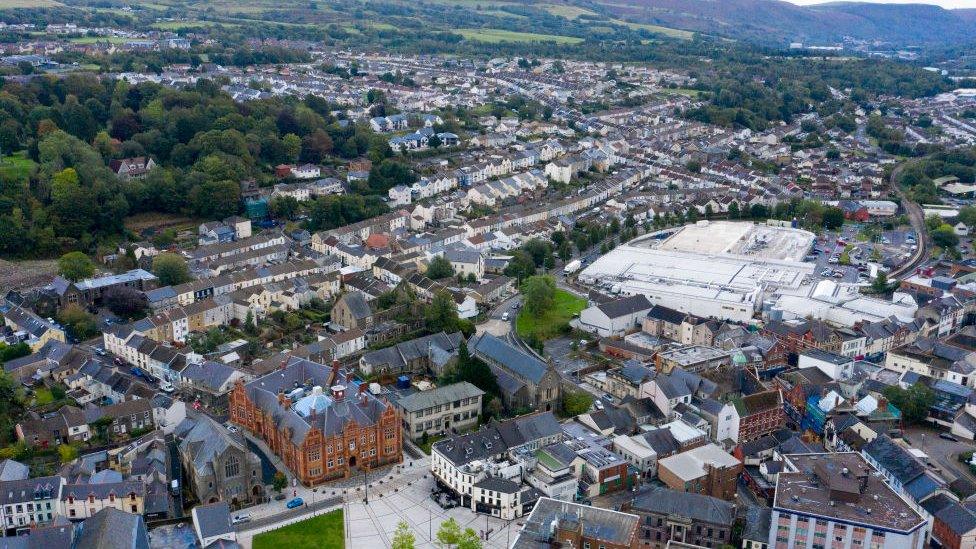
Officials are calling for hope not blame within the communities hit hardest by the pandemic
During the most recent lockdown, as community centres, pubs, hair salons and leisure centres closed, Merthyr Tydfil council leader, Councillor Kevin O'Neill said he had made sure parks and cemeteries remained open.
"We're hemmed in," he said, pointing to the vast open space of the Brecon Beacons just out of reach during lockdown.
"If you close these things, where do the people go then? They clearly go to their friends' houses to congregate, or they might go to the local shop," he said.
"This is the problem we are up against, particularly in Merthyr Tydfil, when you shut down the pubs and community centres - there's nowhere to go, it's pushing people back to drinking at home."
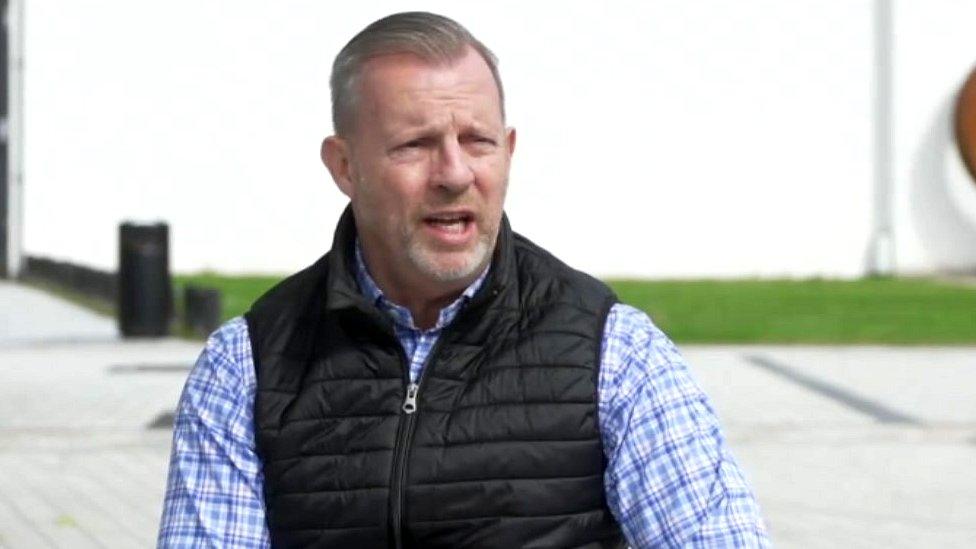
Merthyr council leader Kevin O'Neill said it was not a community specific problem but the nature of valleys people to want to see each other
Mr O'Neill said during the last lockdown many abided by the rules, but that had now been replaced by a "weariness", and even "reasonable people" were now fed up and breaking rules - and there were still those who believed the virus was a hoax.
But he said for many the sacrifices had now just become too much - with people unable to be at births, deaths, marriages, and funerals - and some elderly had been left wondering "how many year's have I got left?"
"I think people have done so much, they really have, it's heart-breaking, that's why you have to have some sympathy for people who say, 'we've had enough'."
People facing hard choices
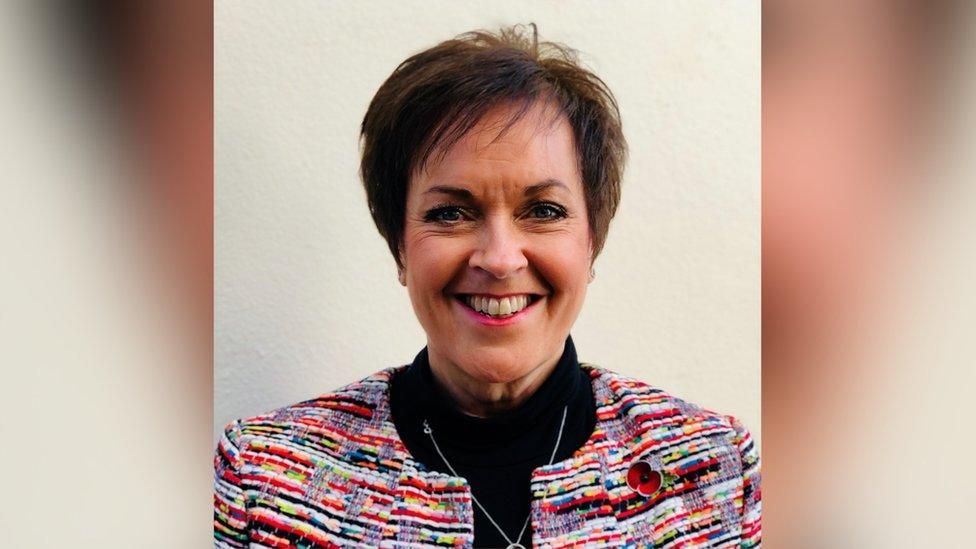
Local Member of the Senedd Dawn Bowden said people were having to make really hard choices
Many working with communities point to cases where people faced stark choices.
Mr O'Neill said some employers had threatened staff, not wanting them to be tested, or telling them they would lose their jobs or not be paid if they self-isolated, and ordering them to switch off the tracking on their phones.
He said the numbers on benefits had gone up by at least 10%.
Meanwhile, Member of the Senedd Dawn Bowden said there were also cases of people spending money to get to work, only to be told they weren't needed and sent home.
She said people were having to make really hard choices, with it being particularly hard on those relying on family members for support, but she added that many people who contacted her, despite their worries, were supportive of the measures.
"The most complaints I get is about other people not abiding by the rules, and there's not a crackdown on them. That's the reality," she said.
'Confusion and apprehension'
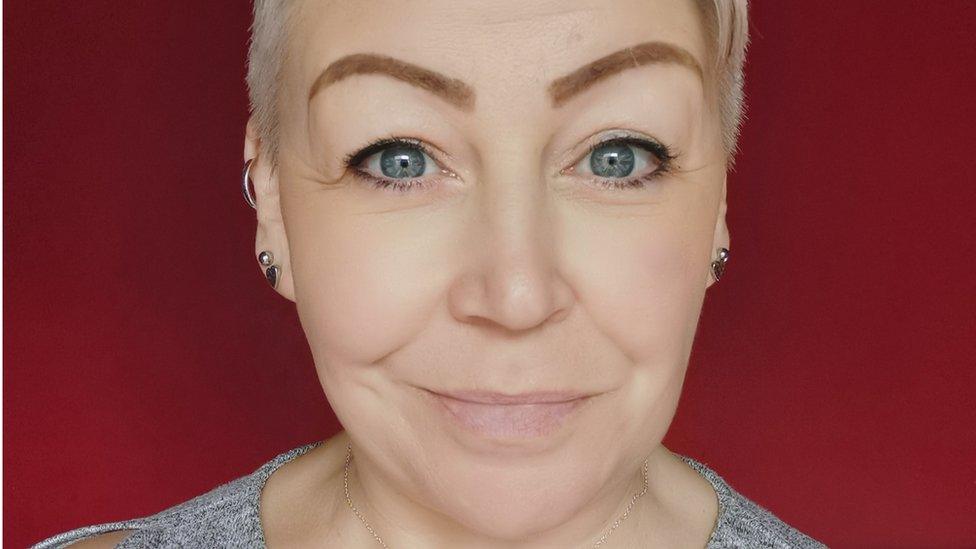
Laura Mochan said she was remaining hopeful for the future but it was hard when people were falling ill and businesses were struggling
Charity worker Laura Mochan, who lives in the community, said she believed the high level of cases boiled down to a "mixture of confusion and fear", and the different messages in different parts of the UK.
"It is my opinion that those refusing to adhere are doing so out of fear of the other factors involved, such as the increase in suicides, job losses and loss of close contact with family members," she said.
"It is taking its toll on us all in different ways. The tragedies reach beyond the virus and its direct affect on people."
Ms Mochan said she she felt more apprehensive than before and worried lockdown may be ending too soon, with people not taking the rules seriously enough.
'Togetherness'
But she said, while it was tough, she felt hopeful that cases would fall, people would stop dying and the businesses would survive.
But Mr O'Neill said, while cases were higher in some communities, the areas were not problematic, and repeated that it was the "togetherness" and "closeness" which sadly was causing the spread.
With the national lockdown coming to an end on Monday, there are concerns, but Mr O'Neill said that he believed the majority of people would do their best and stick to the new rules after weeks in lockdown.
"Someone needs to let the pressure out, we need to have a graduated return to normality, but normality will never be what it's been," he said.
He said that the key message is that people needed to think with every action, if it would put their loved-ones at risk, but what was needed was a "message of hope".
"What makes us so strong is that we are communities, we are together, and we will recover, we will go on, nothing will break us down," he said.
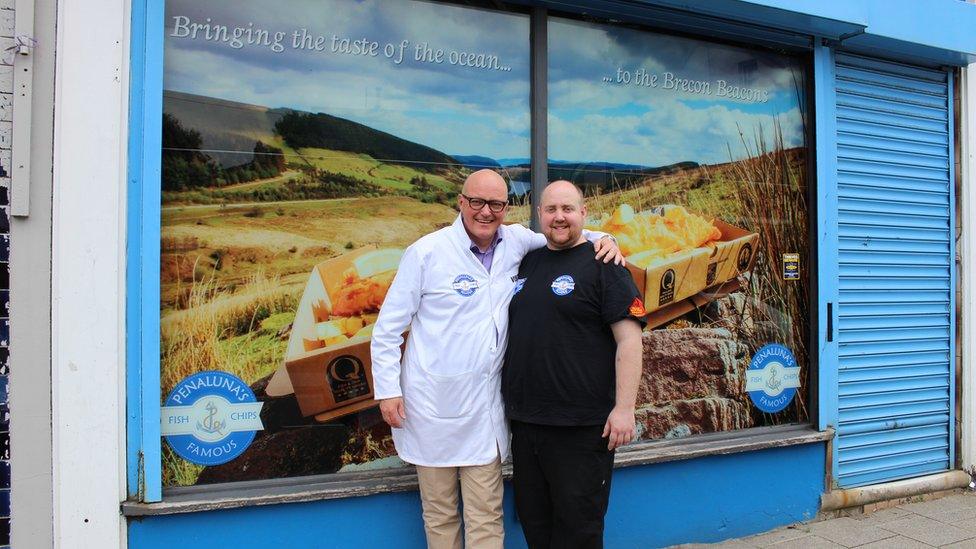
Down the road, in Rhondda Cynon Taf, a chip shop owner says the rules are being adhered to (picture taken before the pandemic)
As figures suggest case rates are beginning to fall in valleys hotspots, down the road in Hirwaun, in Rhondda Cynon Taf, there is hope the message is getting through.
At Penaluna's Fish and Chip Shop, owner Lee Penaluna, said the pandemic had hit his business hard but he had adapted and he now felt positive people were listening to the rules in the area.
"On the Friday we locked down it was mental, but on the Saturday we were down about 60%," he said, adding they had seen a huge uptake in click and collect.
"I've had to take a few customers out of the shop and say, 'you can't come in here, you're not following the rules', but 99.9% of people have been excellent and respected them."
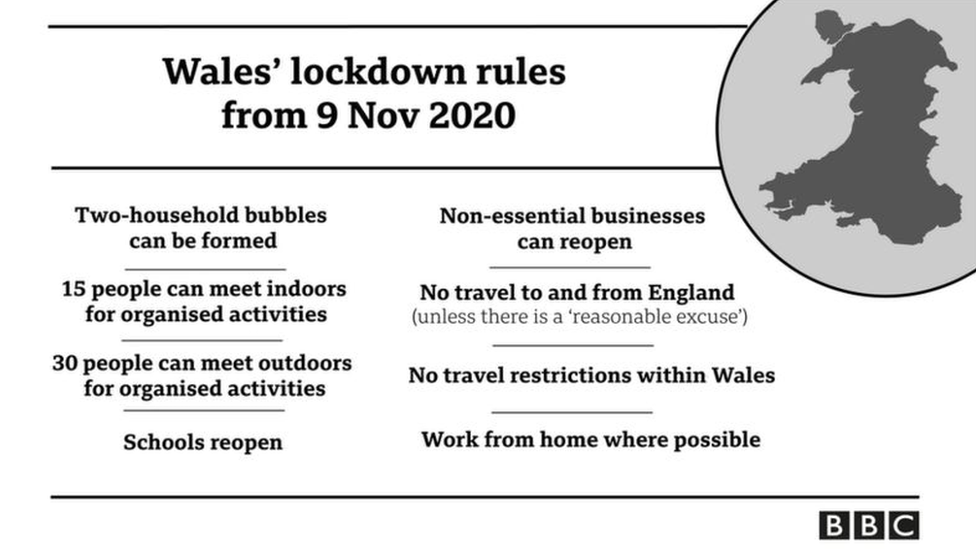
Mrs Lewis said one day the pandemic would come to an end and that people needed to change behaviours and continue to make sacrifices, in the hope there would be some sense of normality at Christmas.
"People are saying this is never-ending, but what we are hoping to see is a slight levelling off in infections in coming days, as the actions of the firebreak come in," she said, adding the outcome of measures would not be seen for weeks.
"We need to renew our efforts, and stick with it, however heart-breaking it may feel."
- Published6 November 2020
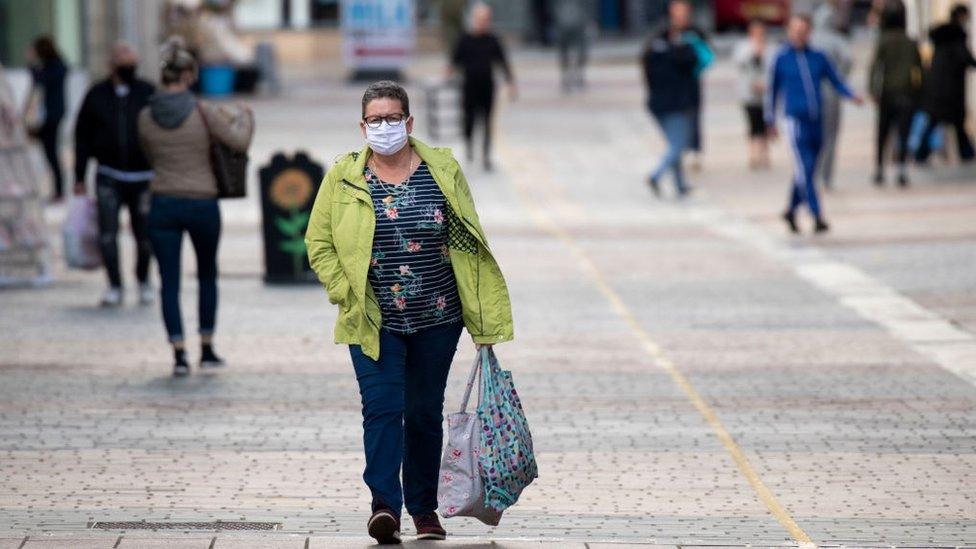
- Published19 September 2020
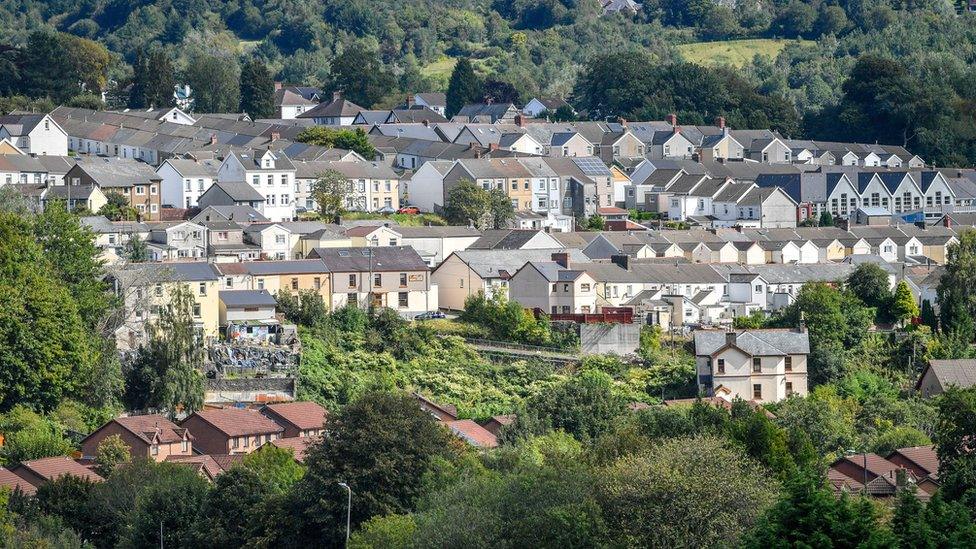
- Published5 November 2020
